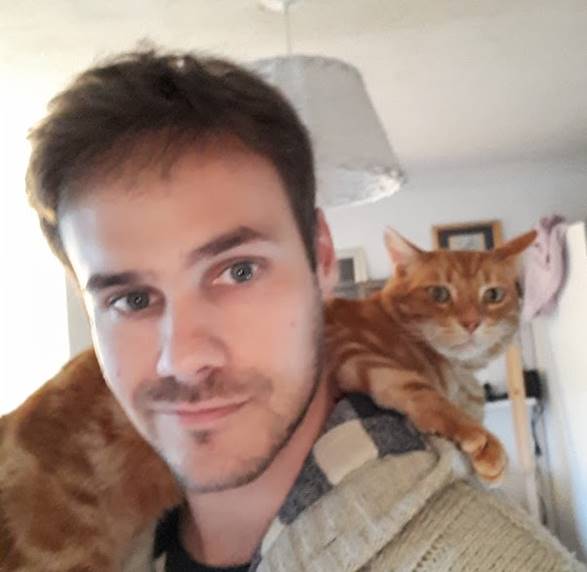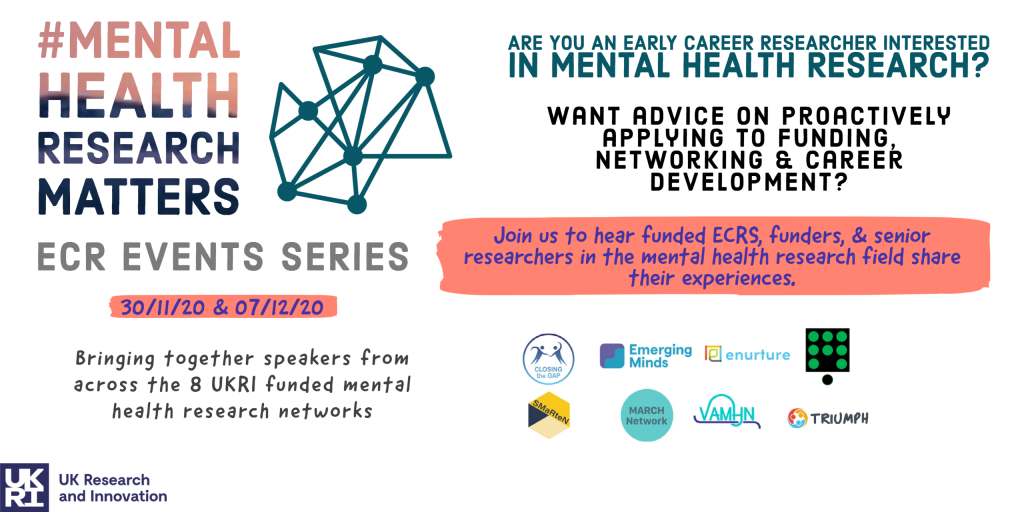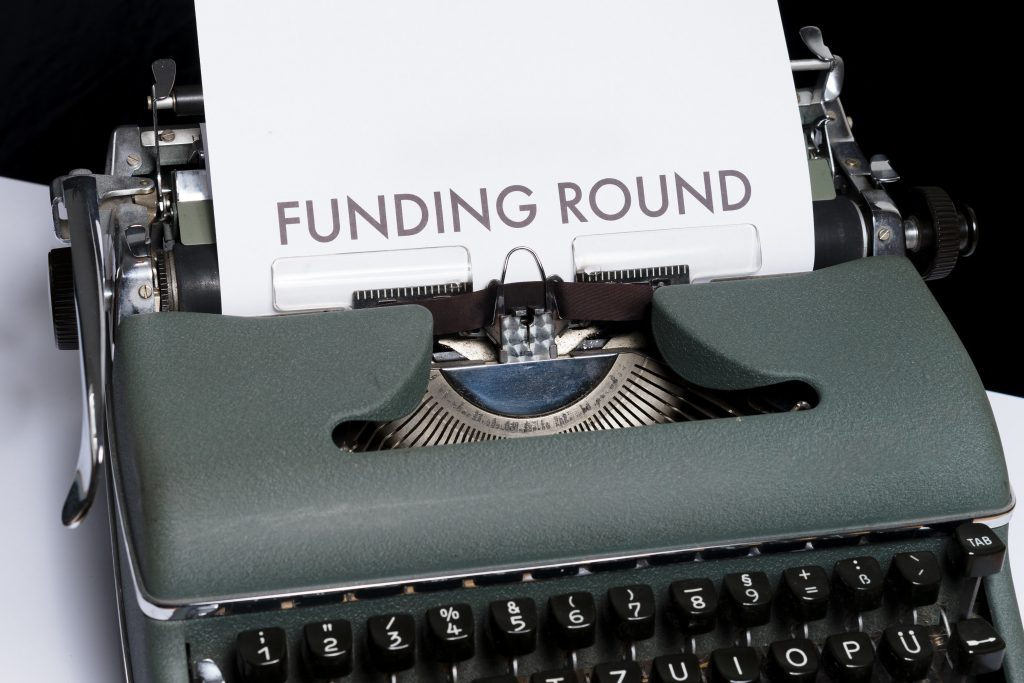
Sam Parsons takes us through an exercise of 5 questions designed to get you thinking about approaching funding applications as an ECR, and importantly working out what you still need to know.
How do I get funding for my research?
This is a question likely to make any early career researcher wilt…and then procrastinate. It is essential to our career progression but it is daunting. It takes time, requires us to quieten our inner critic and effectively sell ourselves amid fierce competition. To help others face the issue head on, we co-organised a series of events for people in the same situation (yes, you could call this the ultimate procrastination). And, we developed this exercise to see if we could work out how to break down the process.
On the 30th November we held an Early Career Researcher event on getting funding in mental health research with the 8 UKRI funded mental health research networks. Both ECR fundees and funders shared their experiences and top tips from their funding application experiences. But for me the stumbling block has always been, how do you get started?

To break down the task, we’ve put together this exercise. We hope that it will be useful in starting your thinking and figuring out what you still need to find out.
If you are attending our “Networking and career development for mental health ECRs” event on the 7th December, bring these questions to ask our panel of senior researchers. In any case, we’re hoping to start a conversation, so please share your thoughts and responses to the exercise in the comments or tweets.
The exercise includes three starter questions to get you thinking and gathering information.
- What you want to get from the funding?
- Identify some potential funding schemes that might work for you. What are the important details (e.g. deadlines, timescales, and eligibility)?
- Who are your potential supervisors / mentors / collaborators and what roles will they have?
These questions lead you to the last two questions. These are the most important ones because they reveal what your next steps will be and who you can ask for advice. What can you do to maximise your chances of success?04. What do you still need more information about?
- What can you do to maximise your chances of success?
- What do you still need more information about?
My rules of engagement. I gave myself one hour to write down my thoughts, browse funders websites, and think through these questions (you’ll probably be able to get much more done in an hour because you won’t have to document every thought). I decided to leave the text pretty raw to reflect the internal conversation that happened while I was working on this. More detail on each question and my own notes to you, dear reader, will be in italics.
Notifications blocked. Old school rock on the headphones. Timer on. Lets go!
What you want to get from the funding?
E.g. is this to further your training, begin your independence, fund a specific project, build a lab?
Broadly, I have a few aims. I want to collaborate with researchers that inspire me and that I can learn a lot from – related to the research area but importantly in methods and stats too. But, this is super broad. It does lead me to think that funding schemes that support working at multiple institutions and in multiple research groups (both in the UK and the EU) would be ideal. So, this will be something that I need to look out for in the next question.
I am not yet at the stage of looking for funding to support a transition into independence or to start a research group. This is because I think I need to develop my expertise and my own research record. Basically, I don’t feel totally ready for that step, and I’m very aware that I’m unlikely to be judged by others to be at that stage either (though I hope that this is also my impostor syndrome talking). So, it’s likely that the schemes I’m interested in will be marked as postdoctoral fellowships, and there might be a focus on developing experience and expertise from experts in the field.
I’d also like funding for myself, which leads me towards thinking that fellowships would be most appropriate instead of grants. Again, this is partly because many grants require established researchers to apply- or at least folk with existing positions in that institution. Because I want to move institutions, this is likely unfeasible. There will be a host of reasons you might want to stay or move institutions and are well worth considering early on.
Identify some potential funding schemes that might work for you, what are the important details?
Am I eligible? Does the scheme match my goals above? What is the timeline? When is the application due?
My first port of call is the Sir Henry Wellcome Trust Fellowship scheme. I’ve known about the scheme for a while, so there is a bias there. But, from memory it’s a scheme that encourages working with multiple groups to develop your own skills. Let’s find the website (here). The scheme covers 4 years (wow, this sounds amazing for a postdoc fellowship), a total of £300,000 funding to cover salary, and other costs. There’s more detail about this, but I don’t need that just yet. Am I eligible? I fit the early-career researcher category and I’d say I have “some initial postdoctoral experience”. Great! The next open round is early 2021, with a deadline for the provisional application on the 23rd March and the full application on the 17th June. OK, this lets me know that it’s a 2 stage application process – let’s find out more about that. There is a preliminary application form and full application form – let’s download those. I spent maybe 5 minutes looking at these. The main difference is that the full application requires more detailed information, but it does look like the project has to be pretty well defined for the preliminary application which is important to know. I also need to have sponsors and mentors identified, which I’ll think about in the next section.
I should look into more opportunities too. So, I opened the UKRI website and they have a funding search page, which looks pretty helpful (https://www.ukri.org/opportunity/). I’ll sort by the closing date because that works best for me. Hmm, there are lots of opportunities, but most won’t work for me – let’s narrow the search to a few specific funding councils – ESRC and MRC are probably most relevant to me (but I’m not 100% sure on this and should look more into this separately). Two popped up that might work for me – the ESRC new investigators grant, and the secondary data analysis initiative. I suspect that they both require me to work at a single institution, but for now let’s look into the new investigator. There’s no closing date, which is nice. I think I’m eligible in terms of career stage, but it looks like I need to have a position at the institution already or an agreement that they’ll have me. I don’t have time right now, but this is something I could look into and ask them or my supervisor about if I’m still interested.
It’s really easy to get lost in all of the possible opportunities and funding schemes. I want to avoid going down too much of a rabbit hole, so I’ll stop looking at this now. But, I have noted a list of schemes I’m eligible for (including deadlines and other important details) and will work on this at some stage.

Who are your potential supervisors / mentors / collaborators and what roles will they have?
How should I contact them and propose these links. What do I need from them at different stages, e.g. during the application, during the funding. Who should I be networking with?
Note: I’ll keep folk anonymous. Having done similar to this recently, this is roughly how things can go.
The Wellcome fellowship requires a UK sponsor to be at the main institution I’d work in. I can’t see a specific number of mentors that they require, but I suspect that having multiple mentors would be useful (both for me and for the application). Ok, I’ve talked about the methods I’d like to use and the stats I’d like to learn how to apply with a few people. I’ll plan to send them an email to discuss the project idea and the possibility of working with them. Let’s say I’ve also worked on a collaboration with one professor who works in the specific subject area I am interested in (we’ll assume that it’s a slight divergence from the one I did my PhD in). Let’s contact them too.
How should I get in touch with all of these potential sponsors/mentors? This can be super intimidating and there’s probably not a perfect way to go about this. Maybe if the timing were right I could try to have a chat during an invited talk visit or at a conference, but more likely nowadays it’ll be email. As I already know one of these potential supervisors well, I can probably informally say hi and ask them about the idea. But the others I don’t know as well, and I’ve never been on the other side of these conversations, so I’ll make a note to ask my supervisor how they’d prefer these conversations to begin. I suspect that I should have a project in mind and a concrete idea of what I’d be asking of them, so perhaps I should work on that now before contacting them.
What can you do to maximise your chances of success?
Note: this question can be hard to answer. Don’t use it as a chance to let the impostor syndrome out, or to beat yourself up for not having something you think might help, or to set yourself unreasonable goals. Use this to plan how to get more information, and to think about the time between now and submitting your application and whether there is something you can work on.
First, I wonder if someone I know or someone in my department has won one of these fellowships before. Most funders websites have a list of funded projects, or I could check the staff page on my department website and search for the funder’s name. After a few minutes I found out that the latter worked better. OK, I have two people that work in my department. I only kind of know them, but it’s worth reaching out – maybe buying them a coffee (or promising one sometime after social distancing) would break the ice. I’ll add their names to the email list I have – again if I have more specific questions for them that would help too. I also wonder if they’d be willing to share application materials, it can really help to have examples (I’ve done this before and folk have been super helpful, you can’t lose anything by asking nicely).
Second, I looked at the CV of one of the people I know who won the same fellowship last year. A personal note is that this is very dangerous territory for impostor syndrome, so be mindful that this is not to compare yourself or beat yourself up, but to look for the things that helped match them to the funding and their project. Maybe it will give you an idea of how closely others prior experience matches the new project application, and it should give an idea of how closely that person has worked with their new mentors before they got that funding. All of these little bits of information can give some indication of what might help with my application – but, we should also take them all with a pinch of salt.

What do you still need more information about?
I have a few questions moving forward, some general, and some I should ask my potential sponsors, mentors, or my current supervisor. Some would be perfect questions to ask at our event on the 7th December.
- (For my current supervisor). I’m looking at this funding scheme, do you think it’s appropriate and can you help me navigate the process?
- Would it be possible to see your application materials?
- I have a specific question about moving during the fellowship, and how flexible the timescale is during the fellowship. On the funding scheme website there’s a contact address I can ask this.
- What should I avoid in this application? This would be great to ask a senior researcher, particularly one that has assessed funding applications before. Are there any things that will mark me down quickly, or that stand out for you in applications?
- Here’s my idea (insert 3 sentence elevator pitch). Do you think that this funding scheme is appropriate, or do you know others that might be?
- How much detail should I have in my research proposal? I don’t want to miss anything important, but I also don’t want to give the assessors too much information that they get lost in it.
- Cheating slightly, I’d like to ask several established researchers with track records of getting and reviewing funding applications what can I do to maximise my chances of success?
Final thoughts:
In case you could not follow my sporadic thinking, here are the take home messages and to do list that I’ve developed reflecting on these questions.
- I have started a document of potential fellowships to apply for.
- I have a short list of emails to send to people I hope will make up my mentor team.
- I have some notes on the project I want to run – but I know that I need to make this a bit more detailed before I contact some people.
- I have a short list of questions that I should ask and aspects that I’m unsure of, as well as who I should ask.
Disclaimer: results may vary. I’m lucky in that I already had some thoughts on what funding I might be interested in and potential mentors I could contact. Even starting from scratch, I have every confidence that you’ll be able to figure out some potential funding opportunities. Most importantly, I’m sure that you’ll figure out what you still need to know and hope that this event series can help .
Additional resources and places to start:
Some funding organisations:
- UKRI https://www.ukri.org/opportunity/
- British Academy https://www.thebritishacademy.ac.uk/funding/
- Wellcome Trust https://wellcome.org/grant-funding
- MQ https://www.mqmentalhealth.org/our-work/research-programmes/
Blogposts:
- For non-exhaustive a list of fellowships and early career funding, see http://rogierkievit.com/postdoctoral-fellowship-opportunities
- Some of my informal (possibly unprofessional) reflections on leading a grant application during my PhD https://medium.com/@Sam_D_Parsons/writing-a-grant-application-as-a-phd-student-reflections-advice-and-grievances-db5ff376ec33
Podcasts about applying for funding/jobs (limitation: fairly US centric):
- The Black Goat Podcast: Take This Job and Pre-Register It www.theblackgoatpodcast.com/posts/big-time/
- The Juice and the Squeeze podcast: applying for post-docs positions http://juiceandsqueeze.net/27
- The Juice and the Squeeze podcast: applying for professor jobs at small liberal arts colleges http://juiceandsqueeze.net/25
- Quantitude podcast: S2E06: Applying for Jobs https://quantitudepod.org/listen/
- Quantitude podcast: Episode 4: Advice for Grad Students https://quantitudepod.org/listen/
Photo by Markus Winkler on Unsplash
Photo by MetalGoat666 on imgflip
Leave a Reply
You must be logged in to post a comment.